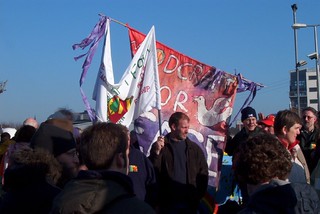 I grew up in a culture of counterculture politics. My parents met in Berkeley during the early seventies, which should tell you pretty much everything you need to know; they were, separately and together, involved in Vietnam protests, equal economic and political rights and liberties, tenants’ rights, and the environmental activities around Peoples’ Park. It’s partially in tribute to them that I, now, have settled in Berkeley myself, after a lifetime growing up in Britain. It still confounds me that it’s considered impolite to talk about politics in some circles, because growing up, it was impolite to not. Although I’m on a more capitalist trajectory, seeing the practical need to earn money as a form of self-protection and freedom, when push comes to shove I’m behind modern activist politics completely. These movements are not necessarily related, but I broadly support Occupy, WikiLeaks and Anonymous; I regularly donate (albeit relatively modest sums) to the EFF, the Southern Poverty Law Center, Planned Parenthood and the ACLU.
I grew up in a culture of counterculture politics. My parents met in Berkeley during the early seventies, which should tell you pretty much everything you need to know; they were, separately and together, involved in Vietnam protests, equal economic and political rights and liberties, tenants’ rights, and the environmental activities around Peoples’ Park. It’s partially in tribute to them that I, now, have settled in Berkeley myself, after a lifetime growing up in Britain. It still confounds me that it’s considered impolite to talk about politics in some circles, because growing up, it was impolite to not. Although I’m on a more capitalist trajectory, seeing the practical need to earn money as a form of self-protection and freedom, when push comes to shove I’m behind modern activist politics completely. These movements are not necessarily related, but I broadly support Occupy, WikiLeaks and Anonymous; I regularly donate (albeit relatively modest sums) to the EFF, the Southern Poverty Law Center, Planned Parenthood and the ACLU.
My politics often inform the projects I work on. Elgg was originally an angry response to the license fees and terms imposed by educational software, which siphons huge amounts of public money away from teaching. I became a part of latakoo because of its social mission to support journalism. I’m proud of both, but there’s no denying that both are commercial businesses, with investors and shareholders; a far cry from direct action.
In fact, publicly, to my shame, I’ve mostly been quiet. So have most of us.
On Friday, I attended an event for Internet Freedom Day, celebrating a year since SOPA was struck down, and also memorializing Aaron Swartz, who had a lot to do with that victory. One of the attendees was Peter Eckersley, the Technology Projects Director at the Electronic Frontier Foundation, who stood on a chair, gave a beautiful speech, and then called the Internet community to action: why are so many Americans, per capita, in prison? The problems of Aaron Swartz’s specific case are numerous, but isn’t this the larger problem? He suggested that this is the problem that Aaron would have preferred us to tackle.
And why can’t we, as a community, tackle this problem? Sure, it’s not specifically a technical problem. But the technology community can certainly help find a solution. We can use big data analysis to look at case reports, determine trends and potentially uncover problems. We can build systems to create better reporting of miscarriages of justice. And we can accept that the technology world is well-connected, wealthy and well-educated, and can make an enormous impact on any social issue if it chooses to. There are network effects to activism, and the tech community has strength in numbers.
This is exciting to me. I believe that activists like Aaron – and the thousands of likeminded people that we’ve never heard of – are extraordinarily brave, and prescient. I do think the tech sector is about to be more political, and I intend to lend my support, my skills and my momentum wherever it is needed. It’s an exciting time for all of us. It’s time for each of us to ask ourselves: do we want to change the world, really, on a societal level – or not?
Leave a Reply